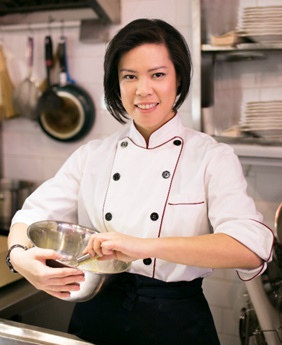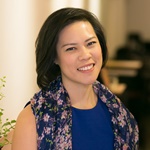Five reasons why my restaurant training is essential to my dietetic practice
Renée Chan | April 6, 2017
I moved to New York City to pursue a clinical nutrition degree and eventually become a dietitian, but, ultimately, the restaurants are what rooted me there for over six years. They made all the winters worth it because being inside these magical institutions shaped who I am today.
My first waitressing job was at a Scandinavian restaurant. It was there that I really began to think about why I originally became a dietitian. I liked to observe people’s ordering habits and how they would eat. Ever since then, I immersed myself into every aspect of the restaurant industry.
I started as a line cook, and then worked as a pastry chef, before I became a sous chef. I eventually transitioned to be an occasional bar-back, barista, waitress or host, and finally the manager – I’ve done it all. Once I was accustomed to the industry and learned the skills of every station in the kitchen, I took advantage of working with different chefs in many kitchens including Italian, Chinese and French restaurants, American steak houses, and seafood restaurants. I was able to keep learning while I worked around the globe.
 This experience led to five key outcomes that have enhanced my current dietetic practice:
1. It allowed me to decide what kind of dietitian I wanted to be
This experience led to five key outcomes that have enhanced my current dietetic practice:
1. It allowed me to decide what kind of dietitian I wanted to be
I felt like I did everything right academically – by the time I received my second degree, I was already working as a clinical dietitian in a large institution. Although it seemed like a sustainable career, I felt I was missing a very important aspect in how to teach my patients to better manage the diseases they were admitted to the hospital for.
I didn't have time to teach food skills in my busy clinical role. It was important for me to have this training and experience but this made me realize what was even more important to me: Helping to change the world through food – one meal at a time!
2. I learned how to work from the bottom up and really understand what it takes to run a business

After three years of clinical work, I decided it was finally time that I learned to cook well. So, I left my job to pursue a career in food service. I didn’t go to culinary school, but as the restaurant industry stands, cooks all start out as the “Garde Manger” no matter where they went to school (or not).
The kitchen is really a place that measures your abilities. In the food service industry, you must have thick skin and not be afraid to learn and take on roles that may not be ideal for you now, but may help you out in the future. This is why I did every station in the kitchen during my first year working as a cook. I even tried early morning bread baking, which meant I was heading to work as last night’s garbage was getting picked up on the streets.
3. I was able to link my dietetic training to non-traditional roles
I eventually moved to Hong Kong to uproot my heritage. It was there that I could really put together my dietetics training with my restaurant experience. While working as a teaching assistant at a small cooking school, I standardized recipes for chefs and got to see the break down of sauces and ingredients in a way that I could visualize the nutritional values that each dish presented. My second job in Hong Kong was a business development manager for a frozen yogurt company. In this role, I was able to calculate nutritional values and food costs for the menu without having to outsource that service to save the business money.
4. I became more creative than ever
Customers always wanted something new and as a manager of a frozen yogurt chain in Hong Kong, I was able to create different dishes for restaurants and played with flavours that many people were afraid to use in ice cream. To continue creating, you must have people who are also willing to try your flavours. Thankfully, Hong Kong was filled with the most jaded civilians ever and they constantly required new flavours and surprises.
 5. I learned to remember my home and family
5. I learned to remember my home and family
Returning to Vancouver after 16 years of a nomadic life, I made a decision to start a business. The concept of True Nosh was always in my head. The name occurred to me as I was giving the gift of maple syrup from Canada to my host families while I was “WWOOFing” in France. I wanted my products to represent the True North in a healthful way. The idea is that your hunger can point True Nosh like the way a compass does for True North. I wanted to start this company for my father, who lost his battle with diabetes and heart disease. I want to make a food and beverage line for those with diabetes to feel normal again and to eat without guilt.
Jobs as cooks and chefs are needed everywhere there are hungry people. Having kitchen and serving experience gives me job security if my own prospects for True Nosh fall through. Throughout this experience, the most important thing for me, no matter where I was living, was the network and friends I made along the way. We traded resources, staff, ingredients, meals, and stories. No matter what industry my friends were in, they were always there for me when needed. After 16 years of living abroad, I have returned home with various skills that enhance my private practice every day.

Renée Chan is a registered dietitian in Canada and the United States. She comes from a family history of diabetes, heart disease, thyroid issues, and Alzheimer’s Disease and is driven to help others with similar concerns. After receiving a Bachelor’s of Science from The University of California, San Diego she went on to New York University to pursue a Master’s of Science in Clinical Nutrition. It was while studying at NYU that she first immersed herself in the restaurant industry as a waitress. After working as a registered dietitian in New York, she went abroad to France to work in organic farms in transition to a residency in Hong Kong. After receiving an MBA from Camden University, she now has rooted herself in Vancouver with
The True Nosh Co. with hopes to stay for good.
Back to Practice Blog